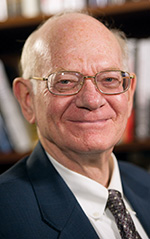Reforming State’s Personnel System Could Work This Time
Speaking Out
BY RONALD E. NEUMANN
America needs a strong diplomacy. But this is impeded by problems with rigid personnel systems, staff shortages overseas, inadequate professional training and dissatisfaction among specialists—all of which are reducing State’s competitive hiring ability.
It is not only diplomats who think so, as a recent article, “Managing the National Security Workforce,” by the Center for a New American Security indicates. Still, since the same issues continue year after year, is yet another proposal on how to fix things even worth writing?
The American Academy of Diplomacy thinks the answer is yes; the timing may be propitious. Our detailed proposals, which have been vetted by a group of senior former diplomats, are ready to be implemented.
We take Secretary of State Mike Pompeo at his word, that he cares about raising standards, morale and teamwork. The new Director General, Ambassador Carol Perez, is looking for new initiatives. Hence, the climate may be more open than in the past.
Also, there is still time in this administration, although just barely, to put new initiatives into practice before they die of bureaucratic inertia and the inevitable turmoil of a new term, even if it should be a continuation of the same administration.
However, extensive consultations with the unions of the Foreign and Civil Service will be essential if changes are to be accepted, implemented effectively and work to benefit employees, as well as management.
Effective American Diplomacy
The academy’s new study, “Strengthening the Department of State,” brought together people with far-reaching experience. The advisory committee included former Directors General and other former senior leaders of the State Department including Bill Burns, Tom Shannon and Roberta Jacobson (who offered Civil Service expertise). And we had input from the deep bench at the Partnership for Public Service, among many others.
We began work on this project when Rex Tillerson was Secretary of State, on the assumption that when the department someday crawled out of the rubble to which he was reducing it, a rebuilding plan would be needed. Secretary Pompeo’s arrival created a new atmosphere. We decided to refocus on a small number of important problems where we could present ideas in time for use by the current team.
Our focus is effective American diplomacy, which demands a strong State Department based on a strong Foreign and Civil Service.
Our focus is effective American diplomacy, which demands a strong State Department based on a strong Foreign and Civil Service. From this start, we delved into four major areas.
Foreign Service Officer Staffing
One is the shortage of Foreign Service officers overseas. The so-called “Iraq tax” stripped personnel from around the world to staff a surge. It has never been repaid, and many of the positions taken from other posts for staffing Iraq remain vacant or were eliminated.
Many of these positions could be filled—without demanding overall staff increases—by, for example, reducing overstaffing in Washington front offices and utilizing positions from offices that are overlayered or have too many deputy assistant secretary (DAS) positions.
Foreign Service Specialist Staffing
We paid attention to Foreign Service specialists, too. State is falling behind in recruitment for many skills, particularly information technology (IT) positions, at the same time that many long-standing complaints from specialists such as office management specialists (OMS) are still not being addressed. Thus, we focused particularly on the OMS, IT and diplomatic security (DS) cohorts that comprise some 70 percent of all specialists.
Our recommendations would revamp and strengthen the Foreign Service specialist system to attract and retain high-quality employees by adopting competitive compensation programs. Further, we recommend establishing additional senior positions in bureaus with large spans of control, oversight and increasingly complex policy and operational responsibilities.
Civil Service Reform: A Pilot Project
The State Department also faces challenges in having two different personnel systems for its American workforce (a third deals with locally employed staff). The Civil Service system is rigid, frustrating to managers and employees alike. In addressing these difficulties, we collaborated with the Partnership for Public Service, a nonpartisan, nonprofit organization dedicated to making the federal government more effective.
Together we recommend a pilot project to establish an excepted service, rank-in-person model for part of the Civil Service. This would be supplemented by robust rotation and development opportunities, a more meaningful evaluation process and mandatory leadership training. A rank-in-person system should also incorporate “up or out” promotion criteria, so that employees have an incentive to reach for higher positions and there is an upward flow of talent.
In developing our recommendations, we heard many concerns. Civil Service personnel were concerned that they would be forced abroad or somehow penalized by change. Foreign Service officers worried that there would be an erosion of good Foreign Service positions in Washington. They were also concerned that CS colleagues doing an overseas tour would compete for good FS jobs.
We believe these worries will prove misplaced because the rotations would be primarily domestic, and the CS rotations overseas would replace other CS overseas rotational programs already in existence and be very limited in number. We think that, in fact, the proposed pilot system will be a win for everyone.
Civil Service personnel in the pilot would have an opportunity to broaden their experience and mobility. The recommendation is for a voluntary system, so no one would be forced into the program. And the overwhelming majority of rotations would be domestic.
Our recommendations would better align State’s management with national security agency counterparts as State competes for Civil Service talent.
For the Foreign Service, the new system would reduce the loss of domestic Foreign Service positions when the need to rapidly meet a staffing priority has often meant conversion of a Foreign Service position to Civil Service because the Foreign Service assignment system is too slow to meet crisis needs.
The new system would allow for both CS and FS rotations, so positions would not need to be converted; and, if occupied by a Civil Service employee, the change would not be permanent. Some Washington positions of high value for Foreign Service learning at the desk level may revert to the FS.
Personnel management at State would benefit, as well. Our recommendations would better align State’s management with national security agency counterparts as State competes for Civil Service talent. State would gain a more flexible way of utilizing its personnel.
Because Civil Service reform is ambitious, difficult and would occur in a climate of considerable suspicion of management, we recommend extensive consultation with employees and their representatives. And, I would stress, we are recommending only a pilot project, which could be discontinued or hopefully adjusted based on experience.
Professional Education
Another area in which the State Department has fallen short for years is professional education and training. A broad lack of professional education—as opposed to training—has been repeatedly identified by us and by other commentators, but the department has made limited progress. The problem is cross-cutting, affecting the Foreign Service and the Civil Service.
We recommend new attention be paid to a career-long devotion to continuing professional education. From the military to law, every endeavor with a claim to professionalism requires and provides for such education. It is time for the diplomatic profession to catch up.
In particular, we recommend establishing a human capital account for the Foreign Service Institute within the State Department’s Working Capital Fund, for all Foreign and Civil Service employees. Such a longer-term funding mechanism is essential for rational professional education planning. Fees from other agencies and State bureaus would feed into the consolidated FSI account, providing it predictability and prominence, and bolstering its capacity to better use resources and provide equal training for all department employees.
State rightly asserts that its strength lies in its people. To work effectively, employees must believe they are valued, trusted and empowered to carry out their responsibilities and have opportunities to grow professionally. Recent conversations and studies of job satisfaction show that this faith has been seriously eroded and, no matter what the Secretary may wish, has not yet been restored.
Naturally, State would immeasurably benefit from a robust budget, long-term fiscal certainty and a true training float, all of which we strongly endorse. Responsibility for these lie with the administration and Congress; we concentrated on areas where State has authority to make changes on its own.
Significant Steps
Irrespective of the budget, the department can, and must, do better by and for its employees. Our proposals will not fix all the problems of personnel, some of which are government-wide and emanate from outside State. But we believe they mark significant steps toward a stronger American diplomatic tool. They are designed to help employees and their professional development, and to assist management in fulfilling its responsibilities to its people and its national security mission.
State is subject to falling behind other U.S. government agencies in the competition for talent at home just as the risks, challenges and threats to U.S. global leadership intensify abroad. Bold, urgent action is necessary to inspire, shape and support a workforce empowered, equipped and prepared to conduct successful U.S. diplomacy.





